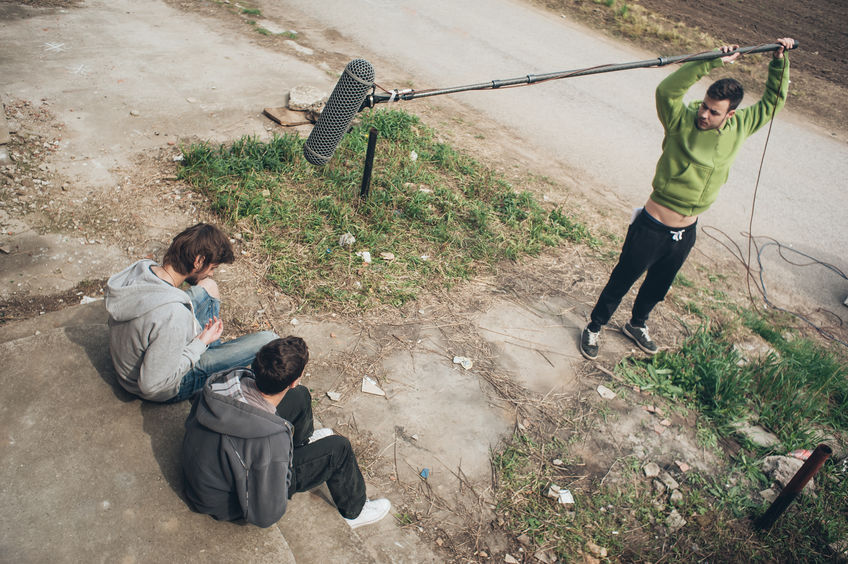So you’ve been shooting videos for a couple of years and now want to narrow down your niche when it comes to clients and your career?
Great! It is always a good idea to pick a niche whether you’re looking for clients or ideas.
Take a look at our list and decide what type of videography might be the best fit for your future business ideas.
You might also like 40 Video Company Owners Answer: “What I Wish I’d Known Before Starting My Video Production Business”
1. Wedding Videography

This might seem like a simple one, and for most videographers, it is an entry point, but weddings are not a piece of cake!
Because you only have one chance to capture key actions, a wedding shoot comes with unique pressures.
That said having a B-camera operator can certainly help soothe stress levels during the shoot. Be sure and bring a lot of memory cards and storage space. It’s hard to know how much shooting you’ll need to be ready for.
Before the ceremony, you will want to clearly define with the bride and groom-to-be what events are most important for you to capture, and which particular blocks of time you are expected to shoot during.
Be sure and get an idea of how much footage they are expecting, talk about whether or not you will be editing the footage yourself, and outline all of this together when quoting your price.
2. Corporate Video

For those who work best with specific assignments under a deadline, corporate videos might be the way to go.
Of course, the suits typically won’t know exactly what they want to see until they see it (remember, this is why they’ve hired you), so even if the assignment aspect plays to your strengths, be ready to creatively channel vague ideas into tangible results.
Working in this kind of scenario is a great exercise; meeting strict deadlines, finding creative workarounds, and delivering a seamlessly professional product.
3. Events Videographer
Falling somewhere between corporate videos and wedding videography, filming an event of some sort can sometimes be the most easy-going opportunity.
While corporate videos rely on your creativity to fulfill an assignment, and weddings mean being ready to capture the unexpected, filming an event can often mean a lot more structure; something will happen according to a set plan and you just need to be there with a camera to record it.
I once recorded a workshop for four days and it was one of my favorite assignments; a camera and tripod were provided for me, there was a specific stage where most of the event was taking place, and all I had to do was show up, hit record, and keep my hands on the camera and the tripod arm for panning.
It might sound easy, but sometimes filming for hours at a time with minimal movement can be physically demanding. Make sure you’re up to the task!
4. Video Management For News Broadcasting

The biggest difficulties associated with working in the video department of a news broadcast company typically involve the sheer volume of material you’re working with.
In opposition to the single external hard drive and laptop set-up of a passion project, news broadcasting can involve massive amounts of data stored in myriad storage banks and virtual clouds, files being sent in from wherever they were filmed, and time is even more of the essence than with other types of video work.
News is assembled as its happening, so if you’re a real go-getter with drive, this might be the right field for you.
One major pro of this working method is that you’ll have video management and editing teams to collaborate with; reliable, experienced, and well-paid! Not a bad gig by any means.
5. In-House Editor/Producer for Large Companies or Government

Similar to the previous category, this is one that involves a lot of different players and moving parts.
It is difficult to predict what kind of working scenario you will end up in while traveling down this type of career path, but one thing is fairly certain: a good spot with good pay.
This category lines up most comfortably with the idea of a ‘day job,’ while still allowing you to do the kind of work you are interested in and passionate about.
6. Social Media Video Production

Since smartphones dictate how the majority of viewing will happen in this category, there are certain trends that have become more or less standardized.
Some things to always keep in mind for this category include working with vertical and square aspect ratios, text captions of any voice-over and the fact that you don’t need to shoot at a high resolution.
For material that will be watched on phones, in most cases, video shot on a phone will be perfectly adequate – but be sure to follow the technical specifications of whoever is paying you for their creation.
It’s also good to keep in mind that most social media viewers will only watch for a few seconds before scrolling onwards, so this category is all about being as flashy as possible as quickly as possible; rapid editing is a must.
7. Music Video Producer

If you’re someone who shines most when it comes to creative opportunities, music videos are definitely something you should try.
As director of the Oberhausen short film festival, Lars Henrik Gass notes in Film and Art After Cinema, “Exceptional music videos often consciously follow the tradition of the avant-garde.” (p. 178)
Music videos are generally very open about what kinds of images are ‘allowed,’ unlike most of the other categories we are looking at here.
Many big names in filmmaking got their start directing music videos, including but certainly not limited to David Fincher, Michel Gondry, and Jonathan Glazer. To take a more recent example, Paul Thomas Anderson has actually made music-focused medium-length projects like Junun (2015) and Anima (2019) in between feature films.
In many ways, music videos offer the creative freedom of filmmaking without as much stress, planning, and narrative cohesion as a feature or short film production. And the focus on producing moving images without text (and already having the score chosen in advance) can be a uniquely thrilling challenge.
Depending on how much creative control is granted, music videos can truly be a filmmaker’s playground.
8. Vlogging a.k.a. YouTuber

A hybrid word meaning Video-blogs, Vlogs come in a variety of shapes and sizes.
While myriad vlogs focus on tutorials and gear reviews, there are also travel vlogs focused on sharing footage from their worldly travels.
Some vloggers simply tell stories about their lives into the camera. While this might seem like the easiest option, it is increasingly expected from audiences that this type of vlogger amazes them with lots of cutting, a good lighting setup, tangential dramatic re-enactments, etc.
If you just want to roll the camera and start talking, go for it.
Just keep in mind that this has become a rather competitive field with a plethora of personalities from all over the world flooding it.
If you have a specific niche that you’re particularly knowledgeable about or have stories about, maybe try to stick to that and find the audience for it.
If you have a specific and original story to tell, don’t let the over-saturation of the market stop you! Just start telling your tale.
Travel vlogs seem particularly attractive to some viewers in this respect; if you can virtually take us to the physical space where the action is happening, that’s absolutely an advantage for your vlog.
If you’re interested in learning more about vlogging and the equipment needed for different types of vlogs have a look at our guide Ultimate Guide To The Tools And Equipment Youtubers Use.
9. Documentary Filmmaker

While documentary filmmaking isn’t easy to get into, it can sometimes be simpler to get started in than fiction filmmaking. However, it requires a great deal of patience and conceptual thinking.
One major plus is that this category might offer the most lenience in terms of what is ‘acceptable’ qualitatively.
It often happens that key scenes in a documentary take place in real-life at unexpected moments, and simply having a record of what occurred is enough – it’s understandable that you won’t always have a Steadicam operator with a 4k camera on standby.
Because there are unique grants and opportunities available to documentary filmmakers, it is not uncommon that first-time documentarians have a background in something unrelated to film or video.
Anyone with a (real) story to tell can theoretically get involved in documentary filmmaking. In this case, the first step might be the hardest; finding a subject with enough urgency and value to dedicate your time to observing and investigating.
It can also be difficult to predict where the story will go, making it tough to plan ahead or conceive of the finished film in advance.
This can work to your advantage as well. Try to remain open to the possibilities of where the work takes you and you just might end up with a far better documentary than anything you could’ve conceivably planned in advance.
If you want ideas on how to go about making your first documentary, you should read our article How To Shoot A Documentary Film From Start To Finish.
You should also know how to interview your subject and manage your camera and sound at the same time. So here’s an article for you: How to get Great Interviews on Camera.
10. Indie Filmmaker

Making it as an indie filmmaker can be a particularly tough case to crack, and often takes years of perseverance.
If independent film directing is your main goal, you should first sit down and ask yourself a few questions, namely; can this story be told in any other way?
If you plan to direct features, it might be a good idea to start with smaller ambitions and first try directing a couple of music videos and short films. It will certainly be a challenge, but it can be done!
Filmmakers like Alex Ross Perry (Listen Up Philip (2014), Queen Of Earth (2015) and more) are a testament to the staying power of total independence so long as you are willing to keep going, find creative solutions along the way, and most importantly: have something to say that only you can say.
That said there is a difference between making your movie and making a movie. Naturally, most people who get into filmmaking want to make their movies to tell their personal stories as only they can. But plenty of directors manage a comfy spot in the industry through reliability.
Steven Spielberg is a good example of someone who built his reputation by sticking to a schedule and staying under budget.
While some masterpieces were forged from a mess of going over budget, over schedule, and all kinds of last-minute changes in script and planning (yes, I’m thinking of Francis Ford Coppola’s Apocalypse Now (1979)), many a successful career was launched by directors (whom we tend not to recognize by name) by reliably getting things made through a tradesman’s approach rather than that of an artist.
It’s important to ask yourself if you would be happy just getting to make a single feature film as long as it’s the film you want to make, or if you would be happy just being close to the camera and crew as long as you get to keep directing. In some rare instances, a balance of both is possible (Get Out (2017) is a good example of this balance, though having such an opportunity for your feature debut without an existing entertainment reputation like Jordan Peele’s is quite rare).
If you would be happy making a single feature film, start saving money and figuring out the cheapest possible means of bringing your dream to life.
For a good example of how to make a thought-provoking film on a shoestring budget, you might take into consideration debuts like Shane Caruth’s Primer (2004) or Agnes Varda’s La Pointe Courte (1955).
Alternatively, for a lesson in dedication to seeing a project through to its finish, read up on the making of David Lynch’s Eraserhead (1977).
Speaking of Get Out and Eraserhead, the horror genre is one that has proven itself to be reliably profitable over time. Even straight-to-home-video horror releases often turn a surprising profit margin. If you want to make something and a little money as a bonus (and decently quick to boot) consider horror.
If you’re looking to become the new Lynch or Spielberg, you should read our article How To Be A Good Director.
It’s a Wrap
As you can see, there are numerous approaches and uses for moving-images, be they for business or art.
And these 10 categories only scratch the surface, so if you didn’t find your favorite approach here, keep digging.
Whatever type of videography you decide to give a go, be sure to give it all you’ve got.

